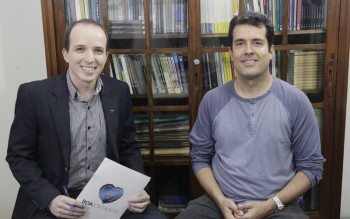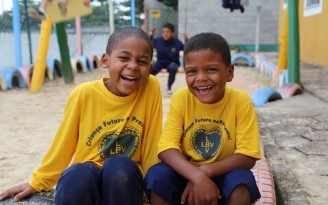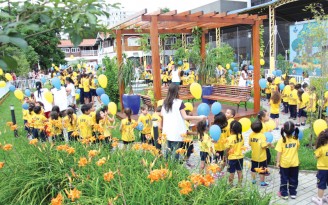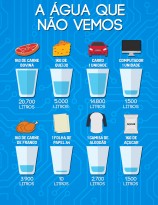
The Serious Environmental Crisis
For Brazilian journalist and writer André Trigueiro, the hostile scenario created by global warming will demand a new civilizing ethics.
Rodrigo de Oliveira
Monday | November 30, 2015 | 5:37 PM | Last update: September 22, 2016, 4:07 PM (Brasilia time)
The imminent environmental crisis threatening the world may drastically change our way of thinking, acting, and making plans for the future. Over the last few decades in particular, human beings have chopped down forests, fished indiscriminately, polluted the air and water, and extracted everything they possibly could from our earthly home, with very little or no concern whatsoever for the continuity and conservation of natural resources.

Many people, however, have been looking for the balance that has been lost, stating that it is necessary to put individualism aside, to have a more solidary attitude towards others, and to embrace causes that are of benefit to this global dwelling of ours. Among those who are at the forefront of these efforts is the Brazilian writer, journalist, and public speaker, André Trigueiro. He works on his blog Sustainable World (www.mundosustentavel.com.br), “making room in the media for a planet in transformation.” He received the team from the Super Good Will Communications Network (radio, TV, websites, and publications) in the Pontifical Catholic University of Rio de Janeiro (PUC-Rio), where he is a professor and the creator of the Environmental Journalism course. He talked about the current challenges and his expectations with regard to the 21st Conference of the Parties (COP21), held from November 30 to December 11, 2015, in the French capital.
André Trigueiro is the chief editor of the Cidades e Soluções [Cities and Solutions] program, broadcast by GloboNews. He is also a Globo TV reporter and a commentator on CBN Radio. He travels throughout Brazil and abroad in search of social and environmental subjects. Below are the main extracts from an enlightening interview where Trigueiro provided valuable information about environmental issues and other relevant topics.
GOOD WILL — Your name is strongly associated with sustainability. Did journalism take you along this path?
André Trigueiro — Getting involved with it was frankly a personal and spiritual choice. In fact, if I were not a journalist . . . I would certainly be engaged in actions the planet urgently requires of us. . . . I would be motivated to build bridges between professional activities and this engagement with a new civilizing ethics that would allow for hope and a chance for Humanity to live on a planet without going short of what is essential for us: good water to drink, fertile soil, and breathable air. This risk [of scarcity] is no exaggeration. It is not sensationalism or alarmism. Unfortunately, the current development model puts our species at risk. . . . Any person who is alive and minimally informed about what is happening should realize that there is no time to lose. . . . I sincerely became a better person with this environmental bias, despite my many imperfections and problems, because it made me more solidary and more concerned with carrying out small actions in my day-to-day existence that interfere in the quality of life of the community.
GW — In order to go to your office on the fourth floor you use the stairs. Does this reflect these small actions?
Trigueiro — That is part of it. I would say that these are spiritual exercises. While we are here we need to leave a legacy and that legacy does not necessarily need to be something visible, what someone is noticing; it is what you in your innermost person achieve. This expresses a truth, a conviction that you have built. That is how people remodel themselves and educate themselves for a different world. A better and fairer world begins with us.
GW — Right at the beginning of our talk you mentioned the spiritual factor. How has it helped you along this path?
Trigueiro — When we talk about the environment, we are talking about an integrated totality and a systemic universe, of all parts that are interconnected, interacting, and interdependent. This is a modern science point of view. It is a spiritual view; I mean, when we talk about the integrated totality, to a certain extent that could be a definition of God. I am a Spiritist and in reading the basic works of Allan Kardec we see, for example, this perception of the integrated totality. All of us, throughout our successive existences (we Spiritists are reincarnationists), advance through all the kingdoms of Nature. But, look, I am not proselytizing here. It [belief in reincarnation] is an individual matter. Each one of us has the right to believe or not to believe in it. Now, what makes the difference, from the spiritual point of view, is what you practice. It is very possible that in the Spiritist, Catholic, Buddhist, and Muslim heaven there are a lot of people in a privileged situation who did not believe in anything on Earth, but who made all the difference to their peers, the planet, and themselves.
GW — In regard to this global effort, what can the world expect from the 2015 Paris Climate Conference?
Trigueiro — First, what is unique about this conference is that it is the first one that allows countries to make voluntary proposals. We will be able to check the willingness of each nation in doing their part so the planet does not enter the second half of the 21st century with an extremely hostile scenario caused by the temperature rising more than 2°C. The second important point is this: before the Paris conference, China and the United States, which together account for half the greenhouse gas emissions, already said what they intend to do; that’s emblematic. It is very interesting because both are putting pressure on other countries. Third: I think that as from [this event in] Paris, we will be speeding up the process of moving towards a low-carbon economy. This means that the path is open, for example, for the World Trade Organization (WTO) to no longer tolerate a product coming from a country that is not strict about its greenhouse gas emission reductions being sold cheaper because the country is not investing anything in substituting coal, oil, and gas. You will be creating an environment in which products that have a very big carbon footprint will no longer be competitive because they are inefficient. I also hope that, contrary to the Rio+20, the COP in Paris has the courage to eliminate subsidies for fossil fuels. We are spending between US$ 800 billion and US$ 1 trillion a year subsidizing a sector that is already profitable. . . . I do not want to live in a world that provides subsidies for the worst enemies of the greenhouse effect. My grandmother used to say something wise, “You can’t make an omelet without breaking the eggs.” The best negotiation is the one in which no one leaves the room fully satisfied. I apologize to those who have not realized that the third millennium is presenting us with an increasingly hostile and more difficult scenario, because we are not facing up to the problems as we should do right now. The world is demanding greater leadership, voluntarism, and altruism. . . . We need to do our part.
GW — In a recent interview you stressed that in the wind power sector there is no crisis. It already accounts for 5 percent of all the energy consumed in Brazil. In 2020, it should be an impressive 10.5 percent. What are the prospects for renewable energy in our country?
Trigueiro — The use of wind power is an international success case. Five years ago no one would have imagined this to be possible. In fact, Brazil surprised both the world and the Brazilians themselves. I became very enthusiastic when I interviewed the CEO of the ONS (National Electricity System Operator), Hermes Chipp, who said, “I’ve changed my mind about wind power. I was scared about an unstable source, because wind does not blow all the time.” Today he believes that the performance will be even more significant over the next few years. We are witnessing a historic period and Brazil is boldly going after other energy sources that are abundant in our territory. The winds in the Northeast are the best in the world. Those investing in wind farm in this region are impressed with what they call the capacity factor. The global average [of this factor] is 30 percent. . . . On August 12, 2015, the capacity factor of the wind farms in the Northeast was an unbelievable 80 percent! And solar energy is going in the same direction. Last year I went to China and in 2013 to Germany and the United States, where I saw that solar energy was absolutely booming. The curious thing is that the best place in Germany for installing a wind farm is the equivalent of the worst place in Brazil. Our potential is incredible!
GW — What responsibility does each citizen have with regard to the global goals?
Trigueiro — To consume in a conscientious way. Consumerism worsens the greenhouse gas effect, because the provision of all the products and services requires the emission of greenhouse gases. If I consume moderately, I am slowing down the CO2 emission. Use energy in a moderate way. Brazilians are already doing this because of our very expensive electricity rates, but it is important to always introduce this into our routine. Favoring public transport as much as possible, or a bicycle when safe, or walking reasonable distances, which is good for the health. We need to value the green areas in the city, because each plant that grows removes or sequesters CO2 from the atmosphere. And we need to reduce water consumption. We are God’s children living on Earth. This home does not belong to us; we are the tenants. And by the law of tenancy I have to give back the property in perfect condition, at least as I found it. . . . There is no such thing as neutrality in the Universe. For you to do Good you have to get out of your comfort zone and be prepared to achieve something. But sometimes mere omission is enough for you to do badly. We need to make ourselves available for the change and this requires attitude and engagement. Do not be afraid to commit to a cause, because that is what adds flavor to our lives.
At the end of the interview, André Trigueiro reciprocated the greeting from the President of the LBV, journalist Paiva Netto, with the following message: “Thank you! Say hello to him for me. We’re in this together. . . . Let’s do our part for a better and fairer world, a sustainable planet.”


